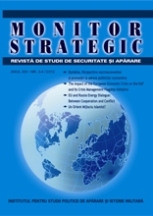Global Goliath vs. Global Leader: The United States’ Difficult Choice
Global Goliath vs. Global Leader: The United States’ Difficult Choice
Author(s): Simona SoareSubject(s): National Economy, Security and defense, Military policy, EU-Approach / EU-Accession / EU-Development
Published by: Editura Militară
Keywords: United States; relative power decline; military power; grand strategy; systemic distribution of power;
Summary/Abstract: There is a new school of American foreign policy – the declinist school recommending the retrenchment of American presence in the system to prevent what it claims is the early sign of America’s economic and military relative power decline caused by Washington’s overstretch. This article takes a closer look at the declinist theses in the military field and finds they are not supported by conclusive and causal empirical evidence; rather, the empirical evidence it provides is circumstantial, while the estimates of the costs of switching to a restrained grand strategy are only presumed to be lower. I look into the economics of the U.S.’ defense spending, including its contribution to NATO budgets support European security, and conclude they do not fully or conclusively support the declinist theses. And while retrenchment or offshore balancing might be theoretically-sound recommendations, they have more to do with managing expectations about America’s future power and status rather than identifying solutions for the short-term problems Washington is confronted with. But implementing these restrained grand strategies might not yield the expected strategic results because while the U.S. might be more secure in isolation, while it may pay less for that security in hindsight and remain the global military Goliath, the winner of the strategic game at the global level, it will no longer be a global Leader.
Journal: Monitor Strategic
- Issue Year: 2013
- Issue No: 1-2
- Page Range: 54-87
- Page Count: 34
- Language: English

